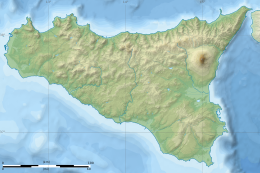| «… the snowy Etna, column of the sky / of acute perennial frost nurturing / compresses it. / They spring from secret caves / purest sources of horrid fire, / rivers in the day pour out / current of livid smoke / and in the night it rolls / with flashes of blood / rocks leading to the descent / deep of the sea, with a roar. “ |
| (Pindaro, Pitica I 470 a.C.) |
| Etna | |
|---|---|
| Etna seen from Randazzo | |
| State | Italy |
| Region | Sicily |
| province | Catania |
| Height | 3 326 m s.l.m. |
| Prominence | 3 326 m |
| Last eruption | 13 May 2020 (in progress) [1] |
| LastVEI | 1 (stromboliana) |
| VNUM code | 211060 |
| Coordinates |  37°45′03.69″N 14°59′38.51″ECoordinate: 37°45′03.69″N 14°59′38.51″ECoordinate:  37°45′03.69″N 14°59′38.51″E (Mappa) 37°45′03.69″N 14°59′38.51″E (Mappa) |
| Othernames and meanings | Mungibbeḍḍu, a muntagna |
| Location map | |
 Etna Etna | |
| Modifica dati su Wikidata · Manuale |
| protected by UNESCO | |
|---|---|
| World Heritage Site | |
| Mount Etna Mount Etna | |
| Guy | Naturalistic |
| Criterion | (viii) |
| Danger | Not in danger |
| Recognized since | 2013 |
| UNESCO card | (EN) Scheda (FR) Scheda |
| Manual |
L’Etna o Mongibello[2] è un vulcano della Sicilia originatosi nel Quaternario. È il più alto vulcano attivo terrestre della placca euroasiatica[3] Le sue frequenti eruzioni nel corso del tempo hanno modificato, a volte anche profondamente, il paesaggio circostante e in tante occasioni hanno costituito una minaccia per gli insediamenti abitativi nati alle sue pendici. Il 21 giugno 2013 la XXXVII sessione del Comitato UNESCO, ha inserito il Monte Etna nell’elenco dei beni costituenti il Patrimonio dell’umanità[4].



